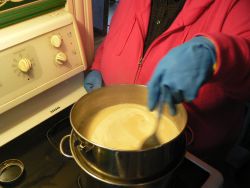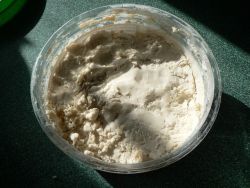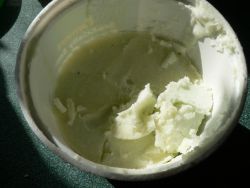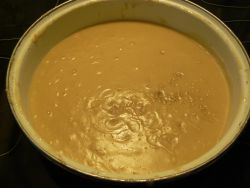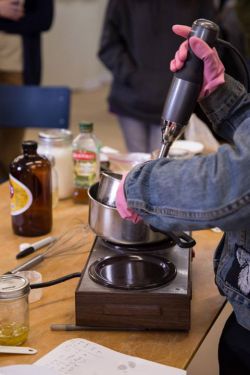Halifax Media Co-op
News from Nova Scotia's Grassroots
A clean getaway: self-sufficiency in soap
As I write I am trying to formulate a soap to sell made entirely from local materials and in the process found myself teaching a subject I've only been studying for about two months. Some online sources (Mother Earth News, Frontierfreedom.com) describe making soap with ashes to be a simple process but I had only varying success.
What is soap:
All soap is made with caustic bases: usually KOH (potassium hydroxide) or NaOH (sodium hydroxide). These bases are referred to as lye. Lye and water are mixed with an animal- or vegetable-based oil and water. All soap is chemically neutral and if made properly should not be drying to the skin.
There can be false implications in the soap industry as manufacturers try to distinguish their product from others. But soaps are largely the same, and you have the perfect ability to make soap for yourself. Up until the industrial period soap was made from leftover fats from parts of the animal and KOH.
KOH was difficult to work with due to an inconsistent concentration, and in the early 1800s a more reliable lye, NaOH was invented by Sir Humphry Davy. Nowadays NaOH is made in an industrial process from limestone and seawater in several sites in the US. One producer of NaOH is Dow Chemical, who sell pesticides and genetically modified seed for industrial farming and have been implicated in a number of toxic chemical spills.
As well, soap ingredients such as stearic acid and sodium laureth sulfate usually come from large-scale animal raising and palm oil, which each come with questions regarding ethical treatment of animals and the felling of rain forests for palm plantations. Commercial products like soap are usually implicated in these sorts of ethical questions which are only really avoided by buying small-scale and locally.
KOH is still used in soapmaking; it tends to make a more liquid soap where NaOH is used for solid soap. If you are going to have a greywater recycling system in your home, be sure to use liquid soap for your dishes, laundry and body or Verge Permaculture tells me that you will poison your plants with sodium-laced wastewater.
Making soap: hot vs cold process
In the hot process, lye and water are added to boiling oils. The cold process adds water and lye to oil or fat that is just melted, after they have been mixed and left to cool, as the mixing reaction generates heat. The benefit of hot process is that the soap is done in about 48 hours. With cold process you must account of your ingredients more accurately, cure it over 4 to 6 weeks. The cold process can make larger batches and use less energy. There are lots of recipes for soap elsewhere online, but a general ratio is 1 part lye and 2 parts water for 10 parts of fat.
This might seem obvious but it took me a little time to understand this: If you need soap to clean up the mess from your soap, your own soap does not have enough lye! While it is better to use less lye than the recipe says and better to have a soap that moisturizes than one that burns, it should also not leave an unpleasant greasy residue.
Ashes soap
My first attempt with soap was pig tallow from a local ethical and sustanable butcher, and lye from wood ashes. I did not have time to set up a proper lye barrel and so my lye required a large investment of energy in boiling down the ashes water until it would float the egg or potato.
The finished lye was orange in colour, and would defintely prickle and redden my skin. I purchased gloves. Because trees are largely making use of potassium and not sodium (plants don't like to be salted with the same kind we like to eat), the lye from ashes is largely potassium hydroxide or KOH.
The pig and ashes remains in my cupboard, a greasy slurry. One sign that the ashes are working is that the slurry has begun to smell like soap, instead of the remains of a living being that once suffered and loved. Philosophically I'm okay with using parts of an animal that was treated well for the sake of the local movement, but I've been vegetarian for over 16 years, and working with tallow was surprisingly gross. Cow tallow is supposed to set harder than lard. I have made a batch of cow tallow and KOH solution at 50% each, which is usually an extreme amount of lye. The crumbly mixture (pic) will dissolve in water but leaves a residue and won't yet make suds, indicating it needs yet more KOH ashes lye water.
Drain-nope: Soap with Sodium
On March 1 I gave a workshop on soap making for Transition St Margarets Bay's Upskilling event. After I offered to teach, I had one week to get the ashes soap to work, or find another recipe that would. Two days before, I gave up on the ashes and lard temporarily and worked on another recipe; cow fat, canola oil, NaOH and water. I returned the pig tallow for some cow at Getaway and bought caustic drain cleaner. While you can get NaOH crystals at some hardware store they can be hard to find (fancy that!) and the Internet remains the most reliable source. Finally 12 hours before my workshop I had a workable soap with the drain cleaner.
Drain declogger is awful stuff, but the main working ingredient is NaOH. Once mixed with the cow, the resulting soap is not caustic and will clean your hands, though it will retain dyes, fragrance and some aluminum oxides and salts. In fact mixing it with fat and water made the drano safer, though personally I might not use it on dishes or my body.
The soap (Which I like to call drain-nope) will be given to Bike Again for use on greasy hands. While drain cleaners might be useful for soap in a short term emergency situation, it is more likely in a low-energy future that we will have many more hardwood ashes than drain cleaners being trucked in from Mississauga. I know which one is more sustainable.
My aim is to end up with a sellable, entirely local soap with lye from ashes and tallow or oil from local farmers. I'd also like to sell it for an affordable rate. Soap making is an addictive, fantastically popular hobby. I was surprised how many cottage-industry soapmakers there were in the province, and perhaps this is how it should be, with the knowlege of something so vital to sanitation being widespread.
If you would like to make your own soap, I recommend the Soap Making Forum, and do watch some videos as the process is best learned visually.
The site for the Halifax local of The Media Co-op has been archived and will no longer be updated. Please visit the main Media Co-op website to learn more about the organization.
